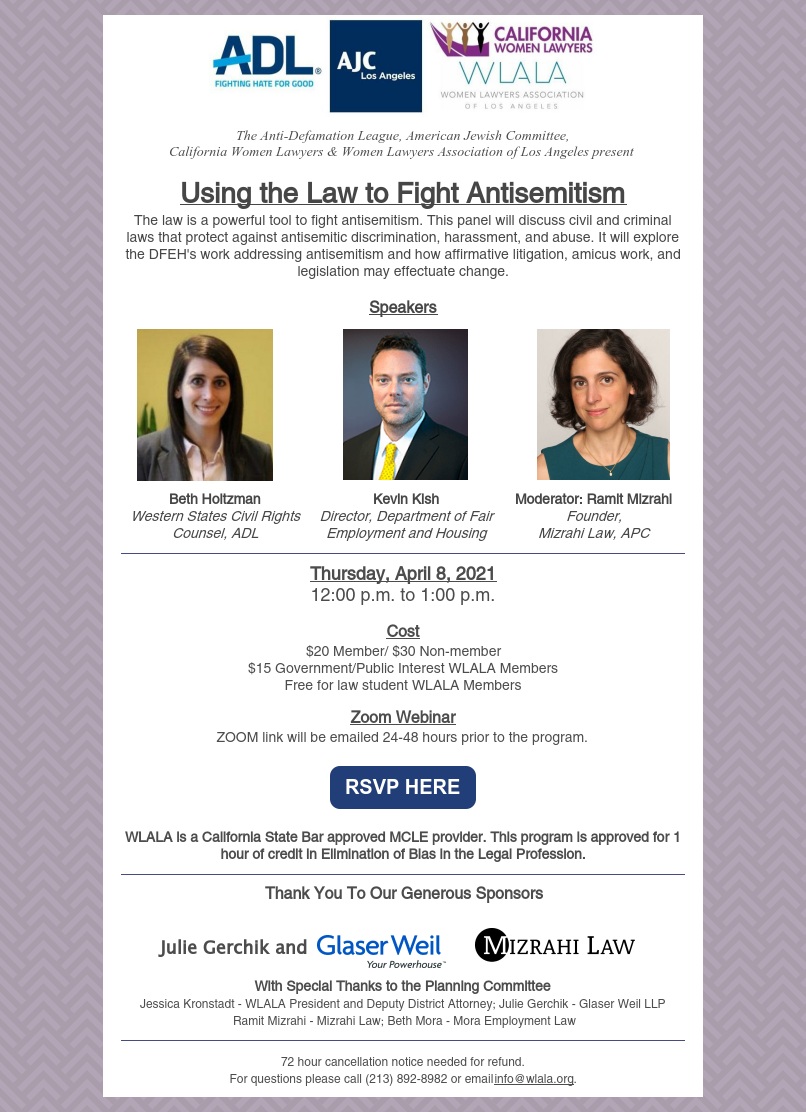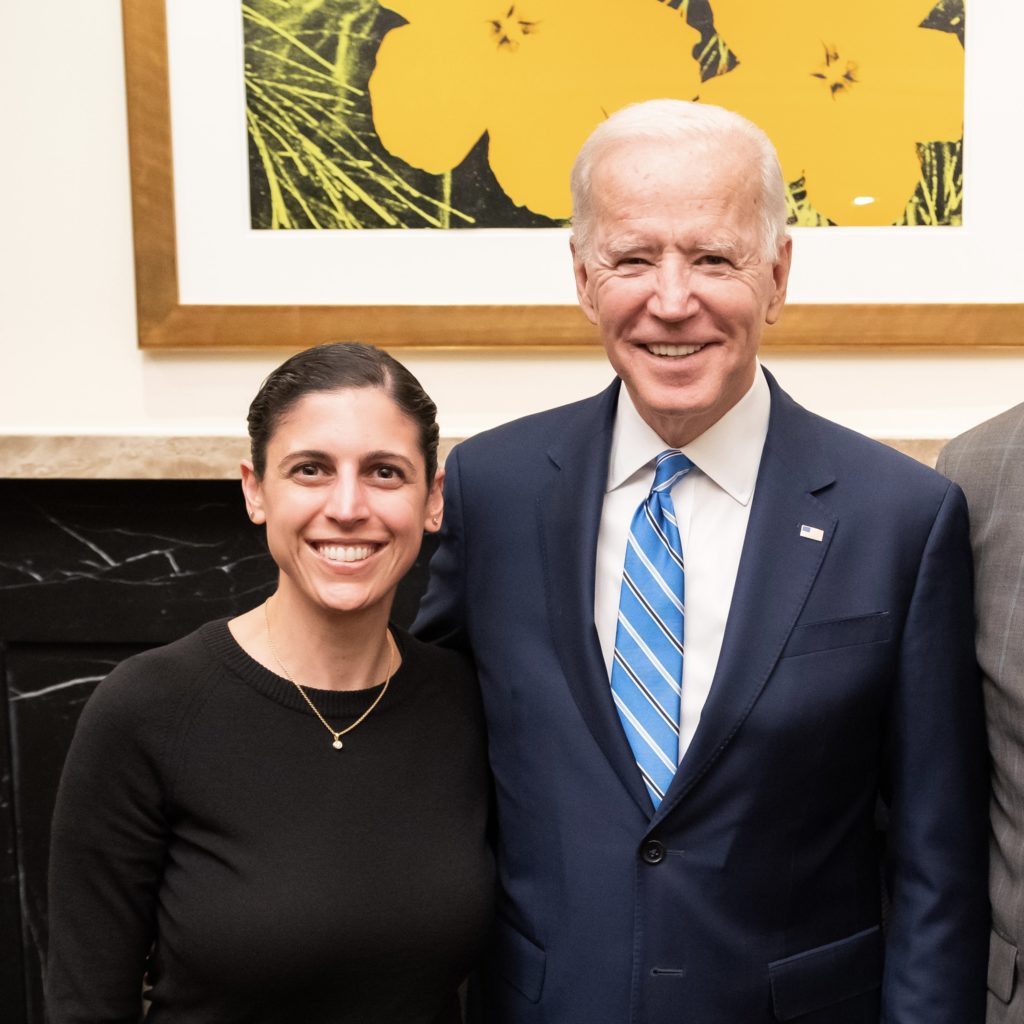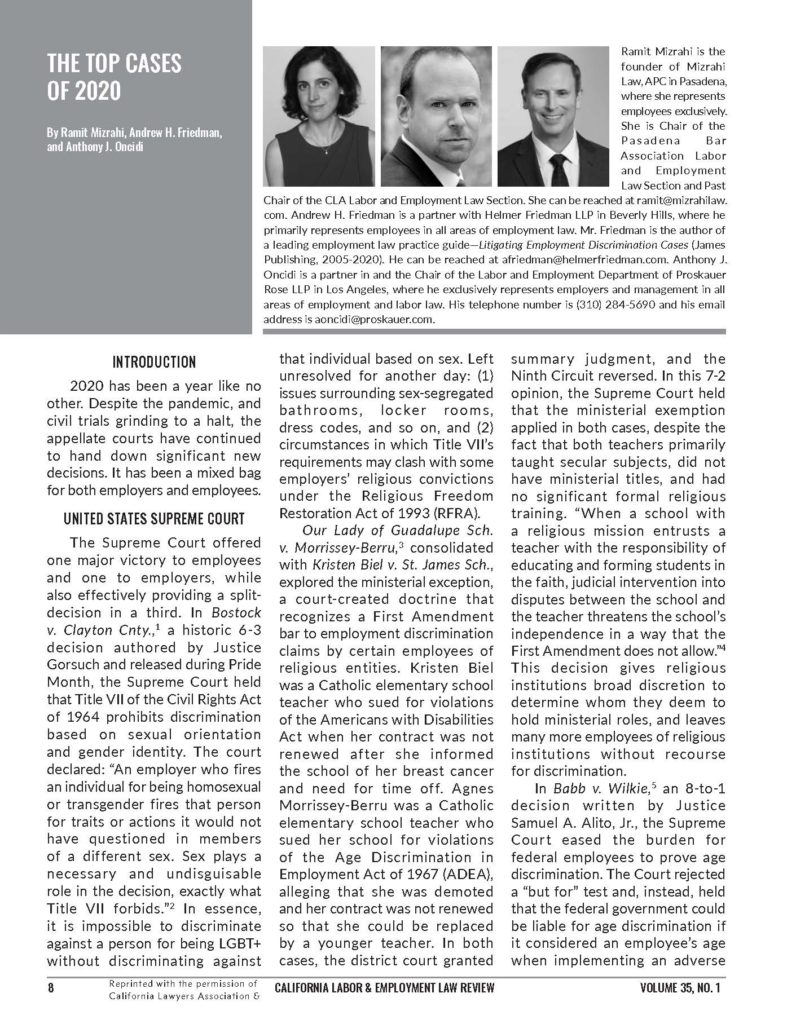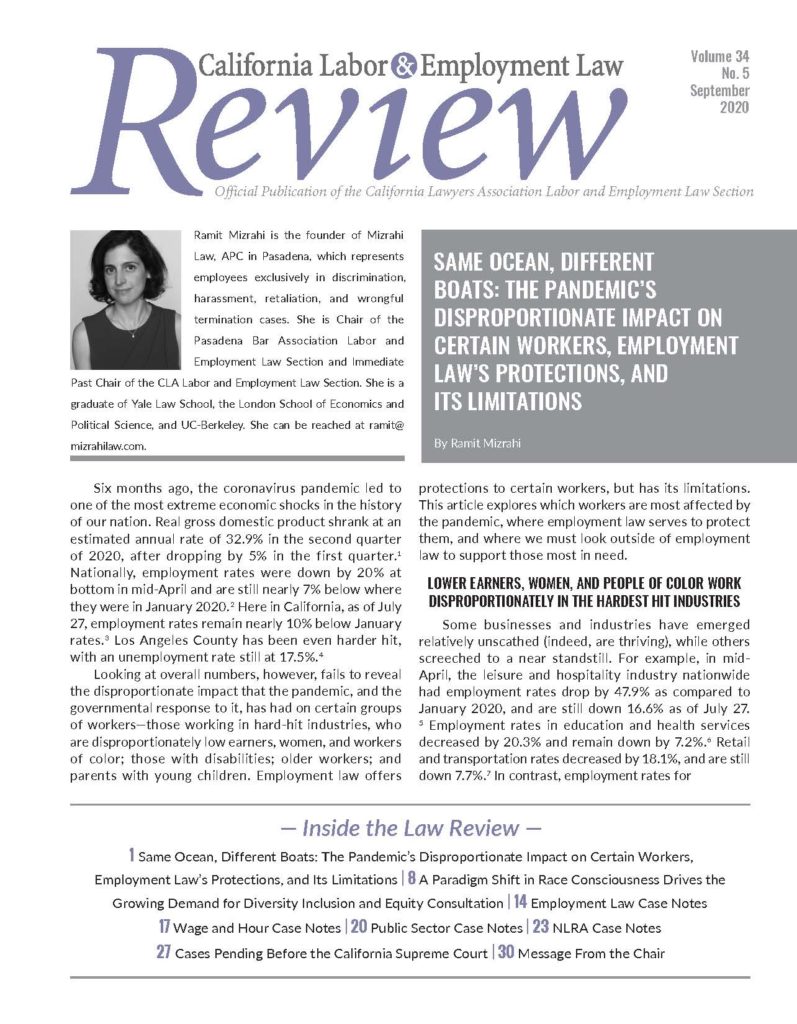-

Ramit Mizrahi has been recognized in U.S News & World Report’s 2022 Edition of The Best Lawyers in America© for her work in employment law representing individuals.
Ms. Mizrahi has also been selected to the 2022 Southern California Super Lawyers® list, again for her work in employment law representing individuals.
Both honors reflect peer recognition of excellence in practice.
This marks the tenth year that Ms. Mizrahi has been recognized by Super Lawyers®, including having previously been distinguished as being among the top 100 Rising Stars and top 50 Rising Stars women for three consecutive years.
Ms. Mizrahi and the Mizrahi Law team remain committed to serving as tenacious advocates for the firm’s clients while working to build collegiality and community in the legal profession.
-
28 Jul '21

On July 28, 2021, the New York Times investigated the practice by employers of encouraging employees who report workplace discrimination or harassment to use employer-sponsored mental health treatment. The article is titled “‘You’re the Problem’: When They Spoke Up About Misconduct, They Were Offered Mental Health Services.” Ramit Mizrahi was interviewed by the article’s authors, Alisha Haridasani Gupta and Ruchika Tulshyan, and is quoted several times in the article.On the surface, the practice of offering employees employer-sponsored mental health sessions might seem to be helpful to employees. But it can sometimes cause more harm than good.
First, employers have an obligation to take all reasonable steps necessary to prevent unlawful workplace discrimination and harassment. This means that when an employer receives a complaint of discrimination or harassment, it should conduct a prompt and thorough investigation and take corrective action as necessary. If an employer pushes an employee to take leave or seek therapy instead of investigating and taking corrective action, then it may not be fulfilling its legal obligations.
Second, when employees sue their employer for workplace discrimination or harassment and they allege emotional harm, some or all of their mental health records from that time period may become discoverable in litigation. Mental health records often reference sensitive information in a person’s life (for example, references to past abuse, family history information, third-party information, sexual history, addiction issues, etc.). If the employer is encouraging employees who complain about discrimination or harassment to seek mental health treatment so that it can later access those records and discover that information in the event of litigation, this can be potentially harmful to employees.
“If a potential client called me and said: ‘I’m being harassed at work, I feel really stressed and anxious. Do you think I should use my company’s E.A.P.?’” Ms. Mizrahi said, “I would advise them against it.”
-

Mizrahi Law is delighted to add Ellory Longdon to the team as our Legal Assistant and Intake Coordinator.
Ellory graduated with honors from the University of Southern California in 2021, double majoring in Health Promotion & Disease Prevention and Spanish. She was a USC Trustee Scholar, receiving a full-tuition scholarship for academic achievement, leadership, and community service.
While at USC, Ellory interned with the Alliance for Children’s Rights, a nonprofit that provides free legal services for children and families impacted by foster care. She also worked with the Los Angeles Mayor’s Office of Economic Opportunity to evaluate the impact of a federal community development grant on low and moderate-income LA communities. In 2021, Ellory conducted research on women’s health policy for the Los Angeles County Department of Public Health.
Ellory is passionate about civil rights, healthcare access, and public policy.
-
08 Apr '21
Mizrahi Law is proud to sponsor the Women Lawyers Association of Los Angeles panel on Using the Law to Fight Antisemitism.
The panel features Department of Fair Employment and Housing Director Kevin Kish and ADL’s Western States Civil Rights Counsel Beth Holtzman, and is moderated by Ramit Mizrahi. The recording remains available for purchase.

-
19 Mar '21

The pandemic continues to take its greatest toll on the most vulnerable among us. It has widened existing inequalities, including with respect to wealth, race, and gender. Indeed, while those who lost their jobs are struggling to make ends meet, many others are seeing their bank and investment accounts swell. American household wealth hit a record high at the end of 2020!
A newly-released report from the California Policy Lab, covered by the New York Times, contains shocking statistics that show just how unequal the pandemic has been in its impact on California workers. The data show that, since the start of the pandemic, about 47% of California workers have applied for unemployment insurance (regular unemployment insurance and pandemic unemployment assistance). However, the most vulnerable workers have borne the brunt of this unemployment.
As I have written previously, the pandemic has had a disproportionate impact on low-wage workers, women, and people of color. The California Policy Lab report explores these inequities in depth, looking at the impact by race/ethnicity, gender, age, educational attainment, and industry. To give some examples:
- About 90% of Black workers have filed for unemployment insurance benefits, as compared to about 41% of white workers.
- Women have applied for unemployment insurance at a rate 6% higher than men (51% vs. 45%).
- Workers with high school educations (or less) were nearly four times more likely to received benefits following the December extensions (55% vs. 14%).
- Workers between the ages of 16 and 23 were particularly hard hit, with about 69% filing for unemployment insurance benefits, as compared to 40-48% of those in the other age demographics.
As of February 2021, nearly 20% of California workers are still receiving unemployment benefits, a rate that is 50% higher than the peak during the Great Recession; they are now “long-term unemployed.”
While we may be seeing the light at the end of the tunnel with the pandemic, our economy and unemployment levels have a long way to improve.
-
22 Jan '21

On January 20, millions of Americans rejoiced as our new President and Vice President were sworn in. Women and girls wore Chucks and pearls to honor Kamala Harris and to celebrate her many firsts as Vice President—first woman, first Black American, and first of South Asian descent. We shed tears of joy, heaved sighs of relief, and felt hope for a better tomorrow.
President Biden delivered a powerful message of hope, unity, healing, and rebuilding. He promised an administration that would dedicate itself to fighting the pandemic, delivering jobs, addressing growing inequality, rebuilding the middle class, securing healthcare, seeking racial justice, returning to truth and transparency, and fighting hatred and divisions.
National Youth Poet Laureate Amanda Gorman captured the moment with her breathtaking poem, The Hill We Climb, which ended:
The new dawn blooms as we free it
For there is always light,
if only we’re brave enough to see it
If only we’re brave enough to be itAfter the inauguration, the President got to work, signing 15 executive orders on his first day in office. More have followed. Already, we see that this new administration, with the backing of the Senate and the House of Representatives, will implement sweeping changes to benefit workers throughout the country.
Here are some of the changes we can expect:
-
The January 2021 issue of the California Lawyers Association’s Labor & Employment Law Review features an article authored by Ramit Mizrahi, Andrew Friedman, and Tony Oncidi.
The article—”The Top Employment Cases of 2020″—highlights the most important California state and federal employment cases from last year. Click on the below image to read the article in full.
Ramit also spoke on two panels this month:
Thursday, 1/14/21, 3-5 p.m.
2020 Is Done: What’s New In 2021?
Program by: Consumer Attorneys Association of Los Angeles
Description: Stay up-to-date on the laws that affect your practices. This program covers new housing laws post-COVID, new employment laws, a personal injury perspective on Proposition 22, and anticipated and current legal challenges to the new laws.Thursday & Friday, 1/20/21-1/21/21
2021 New Employment Law Practitioner 2021
Program by: California Lawyers Association Labor & Employment Law Section
Description: This is the perfect program for the new lawyers, paralegals, and legal assistants who work with you to learn about the basics of employment law. The program will have six panels: Employment Law 101 (discrimination, harassment, retaliation), Leave of Absence Compliance, Wage and Hour 101, Ethics & Bias During Pandemic Times, California Privacy Rights Act’s Top 10, and Complying with the NLRA. -
04 Oct '20

2020 has turned out to be another bumper year for employment legislation. The pandemic provided the impetus for the California legislature to expand family and medical leave to employees at smaller companies, fill in gaps with respect to supplemental paid sick leave, and enact a number of measures aimed at keeping employees safer at work. The California legislature also provided greater whistleblower protections, expanded employer reporting obligations, clarified the law with respect to employee misclassification, and expanded the Labor Commissioner’s powers. Below, we cover the top employment laws that were signed into law or vetoed this legislative session.
-
The September 2020 issue of the California Labor & Employment Law Review features Ramit Mizrahi’s article, titled “Same Ocean, Different Boats: The Pandemic’s Disproportionate Impact on Certain Workers, Employment Law’s Protections, and Its Limitations.” The article explores which workers have been most affected by the pandemic, where employment law serves to protect them, and where we must look outside of employment law to support those most in need.
Click on the below image to read the article in full.
-

UPDATE: On March 19, 2021, SB 95 was signed into law, which provided COVID-19 supplemental paid sick leave (SPSL) for certain covered employees who were unable to work due to COVID-19, including due to quarantine requirements. SB 95 was applied retroactively to January 1, 2021 and was in place until September 30, 2021.
Last week, on September 9, Governor Newsom signed AB-1867 into law. AB-1867, effective immediately, makes sure that all California employees are eligible for COVID-19-related supplemental paid sick leave (“SPSL”) by filling in the gaps lefts by the federal Families First Coronavirus Response Act (“FFCRA”). The FFCRA provides for 2 weeks of COVID-19-related paid sick leave for eligible employees. However, it only applies to employers with fewer than 500 employees. It further allows employers of certain health care providers or emergency responders to elect to exempt them from FFCRA protections. In fact, it is estimated that the FFCRA leaves out up to 80% of the workforce.


